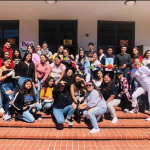Hi Berkeley High School (BHS), we are Alejandro, Gaby, and Ximena, the co-presidents of BHS’s Latinx Unidos club. The club’s sole purpose is to create an inclusive and safe space for students of various Latinx cultural backgrounds. We discuss relevant issues within our communities and organize various social events and fundraisers. We also work to empower one another and create strong Latinx leaders. We value respect amongst each other, in order to prevent criticism, discrimination, and harassment. Our club is essential because it not only serves as an environment where students are able to learn more about the Latinx community, but it also gives light to topics that are normally not discussed enough. There are many misconceptions about and within the Latinx community and we want to break those. Today, we will be discussing the importance of inclusivity in the Latinx community, specific to Afro-Latinx individuals.
For many decades, Afro-Latinx people have been overlooked and forgotten, despite being an integral part of the Latinx community; they have contributed to music, dance, politics, poetry, and so much more. In the 15th century, Spanish and Portuguese colonizers forced Africans into slavery in the Carribean and many Latin American nations. Even though the Africans were compelled to adapt to European culture, they were able to resist and create a mixture of European and African culture and traditions. Afro-Latinx people have made their own religions such as Shango, Santeria, and Umbanda. They have also been the blueprint for lots of mainstream music in Latin America and the Caribbean, such as cumbia and salsa. Additionally, there are many famous Afro-Latinx historical figures that deserved to be recognized, such as Zulia Mena, the first Afro-Colombian congresswoman, Carlos Moore, an Afro-Cuban writer, and Roberto Clemente, an Afro-Puerto Rican baseball player. Afro-Latinx people are a part of the Latinx community and it’s time to shed light on them and their contributions.
As we reflect on the history and stigmas around African people in Latin-America, the importance of uplifting their voices and promoting inclusivity becomes clear. As a Latinx community, it is not enough to just acknowledge the issues of racism and discrimination that have plagued us. We must promote education that allows us to understand that Afro-Latinx people are just as much a part of the Latinx community as any other group. Intergenerational conversations must be held so that we can address the root of the issue. The stories and experiences of Afro-Latinx people must be promoted all across Latin America and beyond. We must create spaces that allow Afro-Latinx individuals to celebrate their cultural heritage free from any judgement and prejudice. Every single one of us must be actively working on a daily basis to create a Latinx community that is safe for absolutely everyone. Through these actions and constant work, we can promote understanding, and through that understanding will come acceptance and empowerment.


